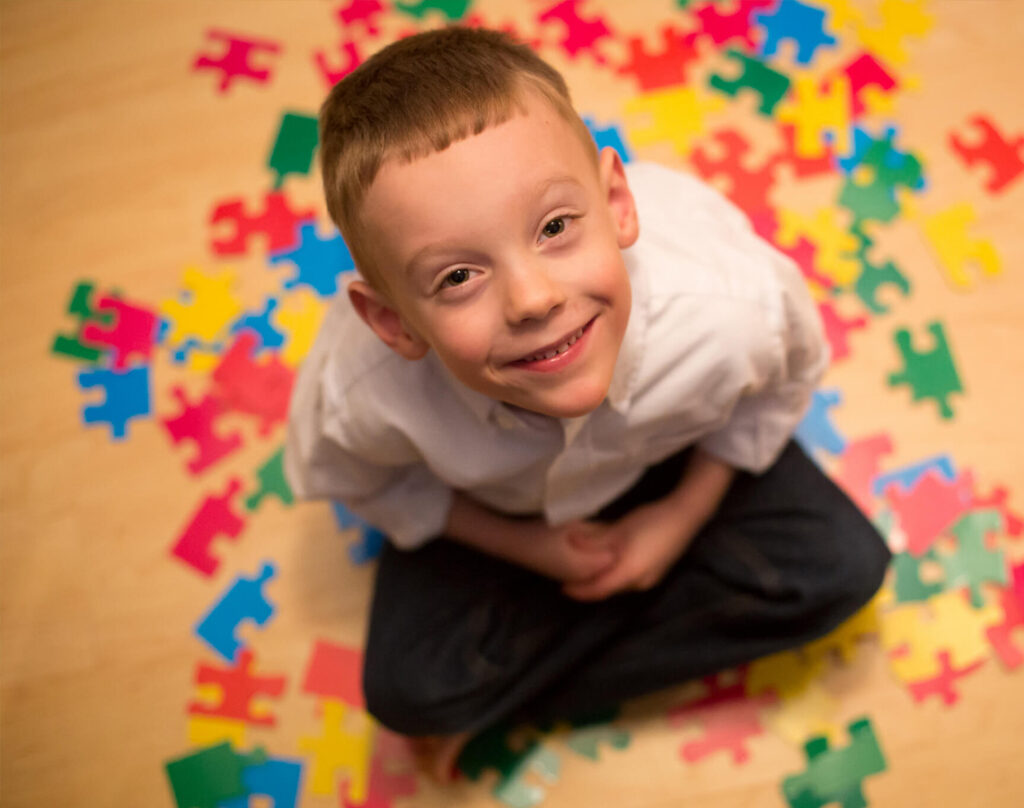
Last Updated on 24 January 2024 by foundationsmile

Autism is a developmental disability that affects communication, social interaction, and play skills. Autism affects about 1 in 88 people and it occurs approximately four times more in boys than in girls. It affects brain function and should be diagnosed by a medical professional. Although every child with autism is different, children with autism will usually have:
Individuals with autism may have trouble processing things they hear, see, smell, touch or taste. Also, autism is known as a spectrum disorder, meaning the severity and type of symptoms are different from person to person. Autism is an evolving disorder and your child’s symptoms and needs may change as they pass through different stages of development.
WHAT CAUSES AUTISM?
No one knows what causes autism. Though genetics play a role in the development of the disorder, there are many other factors that affect the onset and severity of autism. It is important for parents to realize that autism is NOT a result of something you did or did not do for your child.
Early intervention is very effective in Autism and improves the long term outcomes.
Intervention options:
Developmentally-based techniques encourage therapists and parents to work with the child’s own interests or actions to slowly build engagement, interaction, and communication. Often play activities are used rather than more directive methods to help children learn. Recent research has shown these approaches to be very effective for children with autism.
Applied Behavioural Analysis (ABA) – based techniques focus on the child’s interests and motivation to learn new, more adaptive behaviours. They are based on the principles of reward and reinforcement for appropriate behaviours.
Occupational therapy helps children develop appropriate social, play, and learning skills. The therapist aids the child in achieving normal daily tasks (e.g., getting dressed and playing with other children). Occupational therapists may use aspects of sensory integration therapy in order to help the child appropriately respond to and organize information coming through the senses.
Speech and language therapy is often beneficial for children with autism since about 30-50% of them do not use speech. Conventional methods of speech therapy are not always effective. The therapist should have a good understanding of autism and be able to emphasize non-verbal communication, like pictures and gestures if necessary. For children who speak, a speech & language therapist helps them by enabling them to use their language for social interaction and play. The latter is often found to be challenging for children who are verbal.
When choosing an intervention plan, educate yourself on the options which have been scientifically tested and shown to be effective for managing autism symptoms. Be aware that there are prevalent therapies that lack evidence supporting their use with autism. The best intervention plans are those which incorporate aspects of all of the aforementioned therapies as per the child’s needs and abilities.
The earlier the intervention is implemented, the better the outcome for your child. Research also shows that children whose parents are very involved in various aspects of their intervention are more likely to make progress. As parents, you too will have to learn and use strategies that can help your child progress.
Children with autism present with a whole range of intellectual abilities. Some may have higher than normal IQ, while others qualify for a diagnosis of mental retardation. Their skills may be stronger in some areas (memory, math, music) and weaker in others (speech, self-care). Regardless of their abilities, it is important for children with autism to attend school because it provides a structured environment with clearly laid out expectations as well as opportunities for interacting with children of their age. Attending school is greatly beneficial to their development.
Seek the guidance of professionals to help you decide the best type of school for your child. Options include a regular school, an inclusive school (most children are typical, but the school will admit students with special needs), and special schools (meant specifically for children with disabilities).
Learn More: Learning your child has autism can be a very trying time for a parent. Consulting with other parents of children with autism and joining a support group is a great way to learn about the disorder and how to deal with the daily challenges of having a child with autism. It is important for you as a parent to educate yourself about autism so you can become an advocate for your child. Talk to your extended family and share the child’s diagnoses with them. Family members can become your greatest source of support.
Seek Proper Guidance: Seek the guidance of and collaborate with medical professionals like a Developmental pediatrician or Pediatric neurologist and therapists to devise an intervention program for your child. It is especially important that you learn and continue simple, therapeutic strategies at home (e.g. play-based techniques) since the therapist cannot be present at all times. These will help your child function better. You know the most about your child and will be the best therapist they can have.
Remember to Take care of yourself: You must also be mindful of your own well-being. It can be overwhelming to constantly care for and advocate for your child. Make time to do activities that you enjoy (e.g., yoga, going out to dinner or a movie with other adults, etc.). It is also important for both parents to be involved in caring for the child, so that both of you know what to do and can give each other an occasional break
“With love, early intervention and education, people with autism can and do lead happy productive lives and can be integrated into society. The problem is that society is not always tolerant of persons who are different. It is up to us as parents and professionals to educate society and help them understand and appreciate these very special people challenged by autism.”